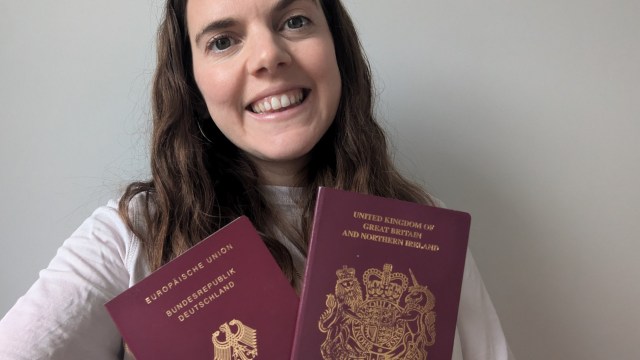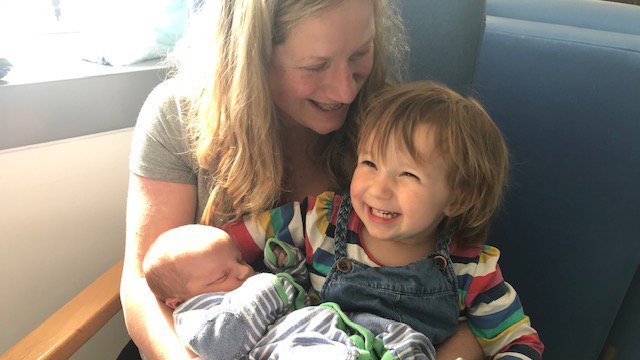On a grey November afternoon in 2021, I sat in a vast room in the German embassy in Belgravia where I was handed some official documents. And just like that, I became a German citizen. There was no big fanfare (although they did give me a badge with a German and British flag on it), but it felt like a significant moment. I walked into the building as a British citizen and left with dual nationality.
By doing so, I joined a soaring number of Brits using their family connections to get European citizenship – which makes it easier for you, and your family to live, study and work in post-Brexit Europe.
The number of people born in the UK who have both a British and an EU passport increased fivefold in the decade after 2011, according to the Office for National Statistics (ONS). Brexit was a major reason: data from Eurostat shows more than 100,000 British people acquired EU citizenship between 2016 and 2022. Meanwhile, ONS data show that the number of UK-born residents with both a British and Irish passport has increased by six times since the 2011 census. Between 2016 and 2020, there were 422,000 Irish passport applications from British people.
My German nationality came through my dad’s mum, who was German and Jewish. After the Brexit referendum in 2016, Dad started talking about applying for German citizenship. He felt strongly that he and his family were European, with both his parents having come to the UK as refugees from Nazi Germany.
The process wasn’t straightforward, and as time went on, he thought more about why he wanted to get German citizenship. As a child of refugees, he’s always felt that how a country treats refugees is important. He was impressed by Germany’s approach to taking in refugees and migrants in recent years – and says it became more than a reaction to Brexit, and instead about accepting that Germany – and especially younger generations of Germans, were truly sorry for what had happened in the Holocaust.
How to apply for an EU passport
- Go to a specialist who offers free consultations.
- You’ll need to have passports, birth certificates, marriage certificates and death certificates that trace back to the relative with the nationality you are claiming.
- Ensure that you have a clear picture of your ancestry and obtain as many certificates to verify this information as possible.
- If you are claiming through a parent it is generally easy to do this without help, but if you are claiming from a grandparent it is wise to seek professional services.
- Prepare to wait for your application to be processed. According to the Immigration Advice Service, the wait time for first-time applicants from the UK applying for an Irish passport is currently one year.
I was also strongly against leaving the EU, and am keen for myself and future generations of our family to stay connected to our roots.
For me to qualify for German citizenship, my dad had to get his first. (Most EU countries use the terms “citizenship” and “nationality” interchangeably. After successfully acquiring citizenship, you can then apply for a passport, which allows you to travel as a citizen of that country.)
There was a sticking point – at the time he was born, citizenship in Germany passed through the father, not the mother. As a result, my dad’s first application in 2019 was rejected on a technicality.
Keen to persevere, he joined a campaign group – the Article 116 Exclusions Group – for people in a similar situation and was able to apply again. My certificate of naturalisation (the piece of paper that said I was now German) was approved in July 2020 and by April 2023 I received my German passport. As well as the smug satisfaction of being able to join the EU passport queue at airports, it means I can live, work and study in Europe. Any children I have will be a German citizen when they are born, too. If I want them to have a German passport, I will just need to apply for that.
Elizabeth Rennie is a lawyer, global migration specialist, and genealogist at Rennie & Buxton Legal Services, a firm specialising in helping clients apply for EU citizenship and passports. She says the firm has seen a rise in applications for dual nationality and EU passports from British people since Brexit, particularly from millennials like me.
“Since Brexit, there has been an increase in that generation [applying],” explains Rennie, explaining they are usually motivated by wanting a connection to Europe, and being able to live, work and study in the EU without restrictions. “Millennials embraced free movement, and I think the loss of it has been hugely detrimental to them,” she says.
The time it takes to get citizenship can vary hugely – anything from two months to four years, she says. It largely depends on which relative you are claiming through – for example, the process can be fast if you’re trying to get Irish citizenship through a parent, but longer if you’re trying via a grandparent.
Having the option of working and living abroad after Brexit is what prompted Rob Price, 33, to apply for his Irish citizenship and passport. He was eligible through his grandparents on his mum’s side, who were both Irish. “I don’t really care about queues in the airport. My main motivation was to give me the flexibility to live or work in an EU country, and also potentially make it easier for my children in the future as well,” says Price. His partner has been able to gain German citizenship through family links, meaning they both have EU citizenship and EU passports.
Price got his passport last year, but not before his mum spent a long time trying to dig out the relevant documents for her parents. “The toughest thing was finding birth certificates for both my grandparents, because they were born over 100 years ago,” he says.
For Andrzej Lukowski, 43, applying for his Polish citizenship and passport had always been at the back of his mind. He grew up in the UK but is half Polish – his father was born in England to Polish parents. Pretty soon after the Brexit vote happened, he started the process. “I do 100% feel that I am (half) Polish. I spent a lot more time with my Polish family than my English family as a child and my dad is a historian of Polish history so I’ve always felt Poland’s history is my history. I’d lacked motivation to get a passport because there wasn’t really a incentive while we were all in the EU,” says Lukowski.
Because Lukowski’s dad wasn’t officially a Polish citizen, they needed some help. “To prove he was Polish we contacted a specialist solicitor who had to dig up my grandparents’ landing papers from the 40s explaining that they were Poles who’d been offered British citizenship,” says Lukowski.
The papers were apparently stored in a disused salt mine in Cheshire, which houses some of the National Archive. To establish eligibility for Polish citizenship and sort birth certificates for Lukowski, his two children and his dad, the solicitor’s services cost about £1,000. Lukowski applied for his passport afterwards, and he was able to do this without the need for legal support.

In 2017, Lukowski, his two children and his dad officially became Polish citizens, although only he decided to get a Polish passport, which means he can travel as a Polish citizen.
Elizabeth Rennie says that, in theory, the application process is “pretty uniform in most EU countries” – you need to have passports, birth certificates, marriage certificates and death certificates that trace back to the relative with the nationality you are claiming.
But there are lots of issues that can come up. “The main things are a lack of documents, people changing their names and inconsistencies with dates of birth. Also, prior to digitalisation, many errors occurred – a child would have a handwritten entry into a passport,” she explains.
In terms of how far back you can go in your family tree to claim nationality, it varies by country – but in Cyprus and Italy, for example, they allow you to trace back to the last male ancestor who had that nationality. “It also depends on the evidence they have and, more specifically, the evidence they lack,” explains Rennie.
There are all kinds of rules and regulations depending on what nationality you’re applying for, too. “Different countries have different modes for receiving your application. For example, if you were to apply for Polish nationality, the outcome does not come back to your residential country. You have to give an address of a third party in Poland where you can collect it,” says Rennie. “And in Cyprus, you have to be born to married parents. If your parents were not married at the time of your birth, and they have passed away and cannot retrospectively legitimise you, then the door is closed.”
Interestingly, she says the issue of nationality not being passed on through the mother comes up a lot, not just in German applications. “You often have to go a line beyond and find the next male,” says Rennie.
Generally, if your parents already have the relevant nationality, the process is easier. “It’s never as straightforward as anyone thinks, unless your parent was that nationality at the time of your birth,” says Rennie. “If you need to go beyond your parents, it’s complicated, because not only are there a lack of records through wars and migration, but also changes to spellings of names. Governments are getting much tougher on the level of evidence they will accept. There is no such thing as one size fits all.”

